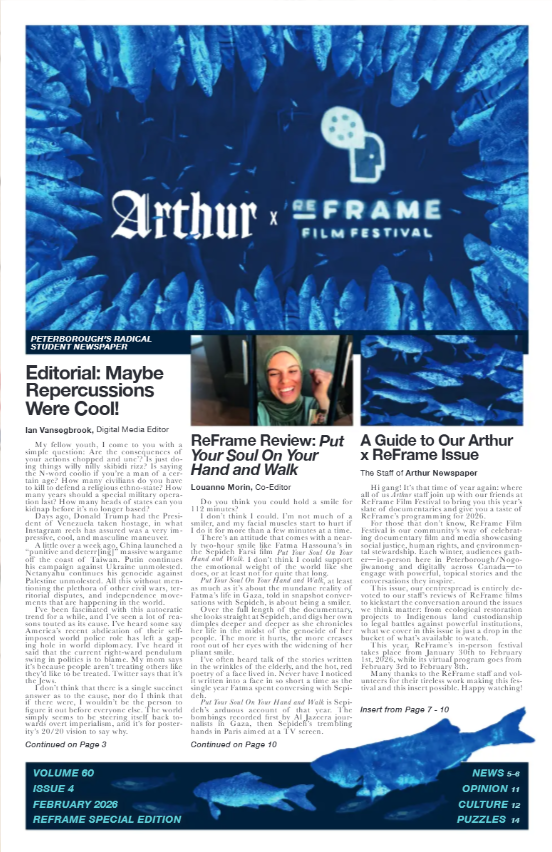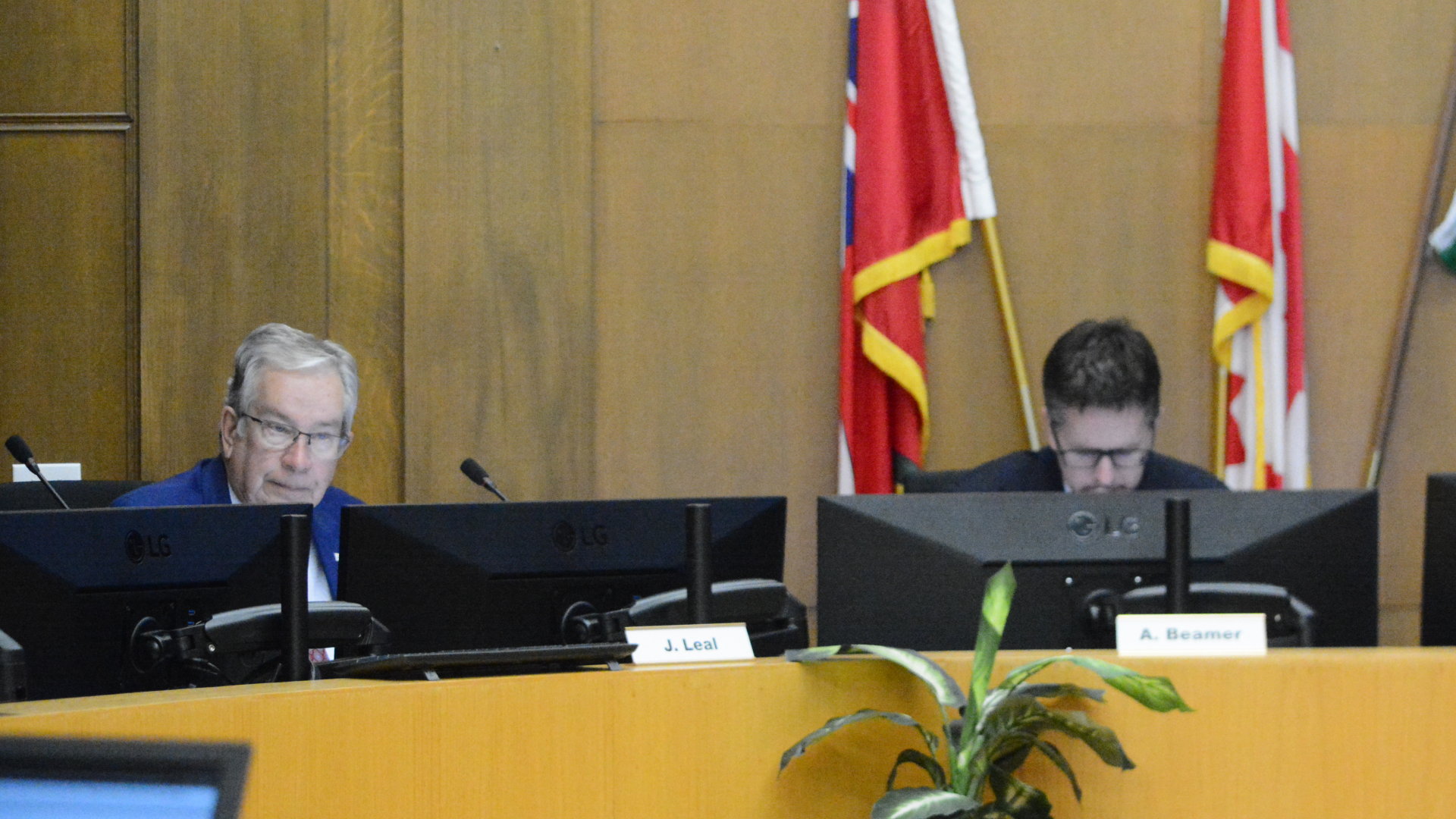On the evening of February 1st, the Community Race Relations Committee of Peterborough (CRRC) kicked off Black History Month with their Proclamation Event in collaboration with the City of Peterborough and the Peterborough Public Library.
The speakers in attendance spoke candidly about Black mental health and wellness, and drew on personal experience in order to reflect on their individual journeys to discover who they were and foster healing in not only their own lives, but empower others to do the same.
Patricia Wilson, Lead Coordinator of CRRC, introduced what CRRC does as a non-profit organization as well as their pillars of advocacy, and the importance of Black History Month.
Wilson articulated the focus of the event, illustrating how Black activists and community members tend to burnout during this period of the year.
“We wanted to focus on making space for conversations around Black mental health, the importance of it and taking care of ourselves,” Wilson told participants. “Our mental health and our well-being should be a top priority.”
After Wilson’s introduction, she invited Mayor Jeff Leal to officially proclaim the month of February as Black History Month in Peterborough. After expressing his gratitude to the Committee, Leal briefly reflected on the history of CRRC which was established in 1983 by then Peterborough Mayor R.J. Barker after an attack on a Nigerian student.
“Black History Month serves as a powerful reminder of the impact of Black Canadians have made and continue to make in our community,” Leal said. “It is an opportunity to recognize the invaluable contributions of Black Canadians throughout our history and to celebrate their remarkable achievements.”
Leal explained how this month provides an opportunity to reflect on the racism and discrimination that the Black community in Peterborough still experiences, and committed to “reject all forms of hate and racism, including anti-Black racism.”
After reciting the official proclamation, Leal invited Ward 2 Councillor Don Vassiliadis to provide brief remarks as Diversity Portfolio Chair for the City.
Vassiliadis touched on City Council’s decision for the City of Peterborough to join the Canadian Commission for UNESCO’s Coalition of Inclusive Municipalities.
“It had to be followed up with action, as rhetoric, empty words, and promises wouldn't help us move our community forward to become a more progressive and inclusive community,” Vassiliadis said. “We needed real and meaningful action, and consultation alongside Black, Indigenous, and other communities of colour.”
The keynote speaker for the evening was Shanique Edwards, Lead Researcher for Black Mental Health Canada and a psychotherapist who specializes in racial trauma and BIPOC mental health.
After an Afrocentric land acknowledgement with a deliberate mention of Black solidarity with Indigenous people, Edwards presented on her approach to her practice as a psychotherapist, especially with her clients of colour.
With her acknowledgement of the progress Black History Month had made since its inception as a week in 1926, Edwards focused her keynote on reconciling with the idea of mental health in tandem with the history that has paved the way for Black people today.
“Our history has been plagued by pain,” Edwards emphasized. “It has been plagued by suffering and by sorrow, and we fought a lot to get to ultimately where we are.”
Highlighting resiliency of Black people and their allies, Edwards stressed the importance of organizing and becoming an active ally to Black people, establishing and maintaining support systems, and displaying a dedication to community building.
Edwards also encouraged people that work in this particular field to prioritize mental health, as they are more susceptible to burnout and struggling with stress induced by activism, through establishing community ties.
“The fact that you are not alone is really something that is rooted in our ability to stand strong in the face of adversity,” Edwards said. “It is because of this historical collectivism why we got to the place where we are today, where we are having proclamations where we have a full month to recognize the achievements of black people and the progress that we have made today.”
She was explicit in encouraging the definition of boundaries between activism and self-care, and the importance of not only saying “no,” but checking one’s own personal inventory.
“It's not just for my community, it's for all of us and the hustle and bustle,” Edwards concluded.
After Edwards’ keynote, Wilson led a Q&A, where community members and media asked the psychotherapist questions on what self care looks like for her, how Edwards’ lived experience informs her practice, and other related topics.
During this section of Edwards’ talk, Dr. Rona Jualla van Oudenhoven, Director of Equity, Diversity, and Inclusion at Trent University, commented on the retaliation she has experienced in her role, especially in establishing spaces and community for students of colour.
“There are maybe two or three BIPOC safe spaces at university campuses across Canada, so it's pretty new, and that obviously comes with a lot of challenges and a lot of pushback,” Dr. Jualla van Oudenhoven said.
It should be noted that Dr. Jualla van Oudenhoven was the only representative present from Trent at this event, and there were no student representatives in attendance.
After a quick break to eat, Ward 3 Counselor Joy Lachica introduced the next speaker, Christine Maclin. A human rights investigator, Maclin oversees anti-racist educational programming, and supervised the development of the Racial Justice Advocate Program as Unifor’s Human Rights Director. Maclin has been involved in a variety of labour movements, especially locally, and Lachica had worked with her previously, yet didn’t know Maclin until she moved to Peterborough.
“It’s amazing how Peterborough does that. It brings people together and what a wonderful community that we have here for that,” Lachica laughed.
Maclin introduced herself with a short overview of her roots, and how they would come to inform her personal philosophy of “never forget where you come from.”
She described an incident in public school where teachers would police her, and how her mother, flustered after a confrontation with those faculty, told her about the barriers she would face as a young Black woman.
“You are going to be treated differently and everything you do in life is not fair, but you're going to have to get through it,” Maclin recalled.
Maclin then spoke dynamically about her career in labour, and the burden imposed unto her through this involvement, especially in equity roles where she would realize that the institutions and systems she worked within were steeped in racism.
“Every black woman, every black person in my organization, was publicly relying on me to be the voice for what the issues were,” Maclin said. “And I have no problem speaking up.”
The activist was frank in her discussion of racism, especially in respect to acknowledging the priorities of capital as inherently racist. Maclin’s experience as an equity officer was revealing in how structures and organizations that are purportedly progressive have very little Black leadership, reflecting their treatment of racialized individuals overall.
Maclin did not mince words about her experiences with retaliation in the workplace for speaking out against racism and standing up for herself, especially during the transition from the “racial awakening” of 2020 into a retaliatory pushback against initiatives that support people of colour.
“My calling is to take all the skills, all of the trauma, all of the harm, all of the hard discussions that I have had over the many years, starting back at Grade three, and trying to recognize that I am not incapable of doing anything, that my skills are different from everybody else's, and that I need to lift my voice in every space so that everybody can lift their voice as well,” she said.
Maclin found her true calling as a consultant after a spiritual awakening in New Zealand, and how being “forced out” of Unifor led to a loss of self for Maclin, so deep that she contemplated suicide as a result of “giving your whole soul to this.”
“Anti-black racism is killing people,” Maclin said as she reached her concluding statements, hoping her lived experience helped illuminate the importance of establishing support systems and finding healing through community.
The night concluded with a presentation and performance by Sahira Q, also speaking to their lived experience as a non-binary Black person, and introducing themselves as a member of the Peterborough community by highlighting the work they do through the local Black Lives Matter chapter, BLM Nogojiwanong. Sahira also encouraged participants to share the chapter’s posts and events on social media, and donate to BLM Nogo’s BIPOC Survival Fund.
“Marinate on these words,” Sahira concluded as they ended their presentation, encouraging participants to reflect on everything Black History Month represents to not only the Black community of Peterborough, but its allies as well.





.png)



.png)









.jpg)



.jpg)

.jpg)


.jpg)
.jpg)

.png)